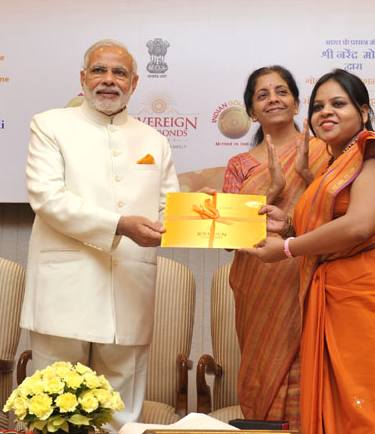

Chirag Mehta, senior fund manager -- alternative investments at Quantum AMC, shares his views.
On November 5, Prime Minister Narendra Modi launched three gold related schemes ahead of Diwali -- Gold Monetisation Scheme, Gold Sovereign Bond Scheme and the Gold Coin and Bullion Scheme.
The aim is to primarily bring out the gold holdings held by households and institutions and put it to productive use.
It would also discourage further physical buying of gold in order to reduce the pressure on India's current account deficit (which results when imports exceed exports).
Gold Monetisation Scheme, or GMS
Aimed at bringing the idle gold reserves out from private holdings and to be put to more productive use by bringing them into financial domain, this scheme is very important from India's perspective.
However, its success lies in how fast they can improvise the scheme to attract and gain confidence of the masses.
A lot of awareness is required. We are trying to draw a leaf out of Turkey's books where it has been a huge success. However, the important difference between both lies in the approach.
In Turkey, the depositor of gold walks in at a bank branch with whom he has been dealing for years and his other savings lie there. Therefore, the depositor has the much needed trust and confidence in the institution with whom he is going to deposit his gold with.
In the Indian context, the customer has to walk in at an unknown collection centre to verify and deposit his gold. It is not going to be an easy task for the holders of gold to part away with their holdings and in the initial phase deal with an unknown entity.
Secondly, the problem of under-caratage in India is well known.
When the depositor goes with his jewellery which is marked as 22 carat and comes to know that it is much lower in purity and, therefore, will fetch less than his perceived value, then there is bound to be a conflict.
Thirdly, the option to select the mode of repayment at the time of deposit may be done away with as the customer would not know whether 8-10 years down the line, they'd require gold or cash. The depositors should be given the option at maturity to select the mode of repayment.
Fourthly, the interest rate offered could have been higher somewhere close to at least 4 per cent to entice holders of gold to part away with their holdings. The current rate offered of 2.25-2.5 per cent may fall short of expectations.
For this to succeed, banks have to play a pivotal role and it would be better if the customers walk into a banking entity where they have the trust and confidence -- an outcome of dealing for all the many years.
Also, awareness and educating the masses is important regarding the scheme.
Sovereign Gold Bond
A sovereign gold bond is a paper alternative to address investment demand for gold in India and thereby reduce physical demand for gold and in turn reduce gold imports (and current account deficit, too).
Unlike Gold ETFs, the bond will not be backed by gold but by a sovereign guarantee. The investors will get interest on the gold bond at 2.75 per cent which will be subject to tax and on maturity will get the prevailing value of gold at that time.
It is a good alternative but following issues will run through investors' mind while taking decision to invest in them:
1. First and foremost, the liquidity (buying and selling at will or when needed) aspect. If I need to sell these bonds before maturity, will there be enough liquidity on the exchanges where they are proposed to be listed.
2. Pricing of the bonds may be an issue: Like for the current bond being announced, the price for the bond is fixed at Rs 2684 per gram for 999 purity. However, the current rate of gold is lower than the issue price and therefore make investors think about overpaying. The pricing for the bonds should be dynamic, that is, investors get the price on the day of investment or the price on the allotment day -- this will help resolve this issue.
3. There is a cap of 500 grams and therefore investors wanting to invest more in bonds will not be able to do so.
4. The interest on the bond will be paid on investment value. Even, if gold prices move up, the yield will be calculated on investment value and not on the mark to market value. Therefore, the yield calculated from the prevailing market price may turn out to be lower than the mentioned 2.75 per cent in the event gold prices have moved up.
Gold Coin
It is a sovereign gold coin. Many countries have their sovereign gold coins. India largely imported gold coins for consumption; this India gold coin comes at a right time when government is pushing the concept of 'Make In India'.
More so, it aims to bring in a measure of standardisation as far as the purity of gold and also pricing of gold goes. The government can also channelise gold collected in the Gold Monetisation scheme towards minting of these coins.
This three pronged approach was much needed from India's perspective. However, there are some limitations on certain aspects which need to be proactively addressed as these schemes develop.
Government and banks need to do a lot of work towards education and awareness of these gold schemes for it to succeed.
Also, an entity like a Gold Corporation is the need of the hour to ensure smooth implementation and coordination of these schemes. That would increase the chances of success where the shortcomings can be easily addressed by a focused entity.
Not only that, India could further develop its gold market and use its strength to become a hub for gold trading, refining, jewellery manufacturing etc as far as the global gold market is concerned.
India has the potential and expertise in gold and also being the largest consumer and holder of gold, this is certainly possible -- an entity like Gold Corporation can help in a big way by creating the right policies to help develop the market.
Photograph: Courtesy, PIB









